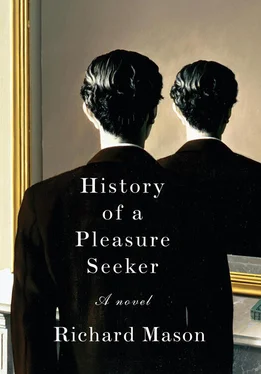The consuls of France, Great Britain, the United States and Russia were waiting on the quayside to welcome the Eugénie ’s first-class passengers, the Polish representative having been delayed on his train from Johannesburg. Verignan had hired every spare automobile in the city and had them repainted and stamped with the line’s shell and crossed L s. The last was leaving the port when Piet and Stacey emerged from the customs shed into a jostling horde. Black porters were heaving trunks onto their backs. Indian boys in fezzes and gaiters asked for tips and picked pockets when they could. One or two dark-skinned gentlemen were examining the contents of the Eugénie ’s hold in suits as smart as any Piet owned, and this sight shocked him most of all. He had expected to find the natives in appropriately exotic dress.
The same impulse that made Piet Barol mistrustful of elevators and other novelties now expressed a strong preference for a driver who resembled the cabmen of Europe. Stacey waited in the shade while he obtained the only remaining vehicle driven by a white man, a barouche upholstered in burgundy velvet, slightly frayed, and drawn by a pair of high-stepping grays. Its driver was a helpful and dapper Cockney who took them for persons of the greatest quality. Once lifted in and comfortably ensconced, Miss Meadows said: “I did enjoy watching you get the best carriage, Mr. Barol.”
Stacey Meadows did not intend to rot her life away in the chorus of the Opéra Comique and was well aware of the fate of girls in her position who made no plan before losing their looks. She refused, absolutely, to strike the Faustian pact of the courtesan. For some time she had been on the lookout for an alternative insurance against the indignities of middle age in the demimonde. She had rarely encountered a mate as suitable as the heroic figure at her side, his glance so smoldering she barely noticed the blazing yells, the street cries and gay colors of this city at the far end of the world. She decided to address his likely disadvantages immediately. “I see from your passport that you are French. I suppose that makes you as unreliable as you are diverting.”
The carriage turned into Adderley Street, a thoroughfare lined with buildings as handsome and solid as any in Amsterdam. Piet had imagined roads of mud, but the avenue was well paved and dissected by tramlines. Among the seething crowds were people as elegantly dressed as Sunday strollers in the Vondelpark. Much was reassuringly familiar, but the diamond-sharp brightness, the smells of spices and salt water, the vast mountain guarded by a rock in the shape of a watchful lion, declared the newness of this world and its possibilities. His courage revived, and with it his conscience.
“It is not my real passport, Miss Meadows.”
“Indeed?”
“You may rest easy. I am Dutch by birth and we are a most dependable race. My mother was French. I traveled on papers she once obtained for me.”
“Are you a fugitive from the police?”
“From myself, only.” The thrill of sitting beside a clever woman with a large check in his pocket did not override Piet’s distaste for the subterfuges of the life he had left behind. He decided not to begin with a lie. “I was not a first-class passenger on that ship. A friend of mine was a steward and let me in to see the opera because he knows I care for it so.”
Stacey’s face fell. “Do you mean to say you have no money?”
“This morning I had barely sixty guilders to my name. Now I have a thousand pounds.”
“So you are a thief!”
“Far from it.” Piet showed her Jay’s letter and told the story of his discovery, his flight from the stewards and his rescue by a passenger of means, who had invested the capital to start him off in business.
“You must have been very persuasive with this American gentleman.” Stacey Meadows looked at him skeptically. The moral certainties of her Chicago upbringing had been thoroughly overthrown during two seasons at the Opéra Comique, which had taught her a great deal about the range of human inclination. She knew many men who preferred their own kind, more or less openly, and had long lost the habit of disapproval. But the animal part of her nature was disappointed and slightly surprised to learn that her companion might be one of them. His poverty allowed her to be direct. “I don’t mind the slightest bit — but tell me — what did you do to earn such a sum? I know very well why moneyed men take an interest in people like us.”
Piet, who never did so, blushed deep scarlet.
“I thought as much. Did you enjoy it?”
He hesitated. “In a novel sort of way. The alternative was being put off the ship at St. Helena and spending my life there. I looked for you first, you may be sure.” He told her of his desperate hunt for her cabin. When he had finished she was smiling, despite herself, and he snatched her wrist and kissed it.
The fervor with which he did so reassured Stacey Meadows, who decided to overlook a desperate act. Though she withdrew her wrist she was very pleased.
The carriage trundled beneath an ornamental arch and entered the Company Gardens beside a palace of rose brick and blinding stucco. Ahead of them stretched a shaded avenue from which paths twisted seductively into lush vegetation. A Greek temple faced the mountain, brilliantly white against the sky. Wherever they looked were flowers they had never seen — explosions of purple on long, swaying stems, trees hung with fanfaring trumpets in pink and red. They were both silent at the wonder of it, and in that silence Stacey Meadows thought quickly.
She had assumed that her companion’s income matched his beauty and was disconcerted to find this was not so. His candor, however, even on the most delicate topics, set him apart from the smooth-talking beaux who usually pursued her. She thought of the way Germaine Lorette had sabotaged her curtain call and a longing to escape the cutthroat competition of artistic Paris seized her. To do so with a worthy collaborator might be more diverting than marriage to a magnate who would doubtless have objectionable female relatives.
She turned her subtle, strategic mind to the situation at hand. “It is wise to pretend to be French if you wish to make furniture and gain a rich clientele. You should exploit, as your friend suggests, your European glamour. What about Monsieur de Barol, monsieur le baron ? A title would suit you admirably, and since you are starting afresh …”
“If one does that one might as well be a vicomte.”
“An excellent suggestion.” Stacey withdrew from her purse the little platinum band her first seducer had given her in New York and slipped it onto the wedding finger of her left hand. She felt that her embrace with this delicious young man had been delayed quite long enough, and that once it had taken place she would be clearer in her mind. They proceeded up Government Avenue in tingling silence, her invitation well understood by them both. They passed the prime minister’s house and a museum of natural history that resembled a French château, crossed the traffic on Orange Street and entered the fragrant grounds of an imposing hotel built on the foothills of the mountain.
The drive was thronged with the vacated motors of the Eugénie ’s first-class passengers, and the sun struck their eyes so sharply that both of them emerged from the barouche with lids half shut. A doorman appeared immediately with a sun umbrella. In a lobby full of the sweet scents of luxury Stacey wrote The Vicomte and Vicomtesse Pierre de Barol in the visitors’ register. This, and the quality of the Louis Vuitton trunk the bellboy brought in, inspired the manager to issue instructions for a suite on the first floor to be prepared rather than the room with bath that Piet had engaged. He begged them to take a glass of champagne punch on the terrace while it was being made ready.
Читать дальше












